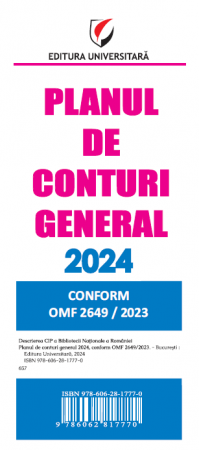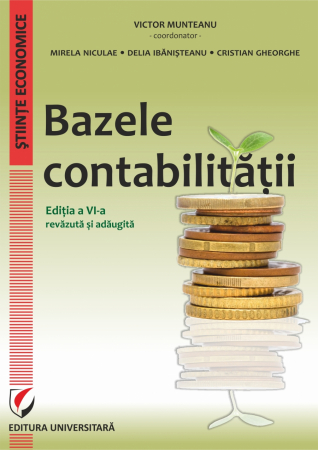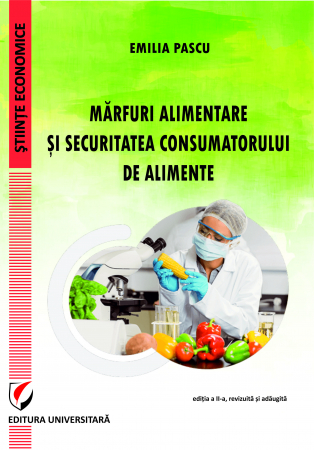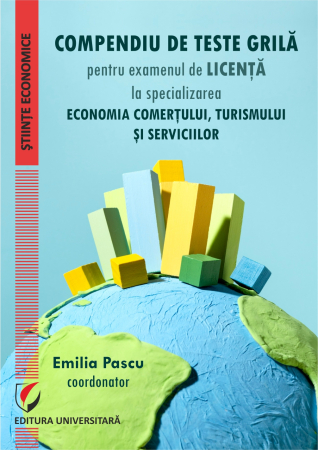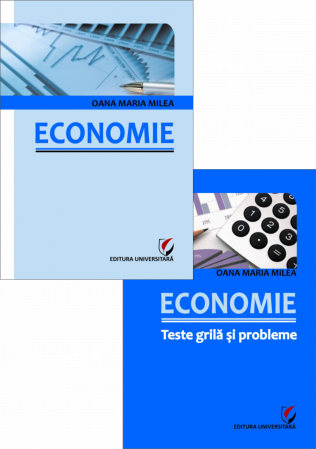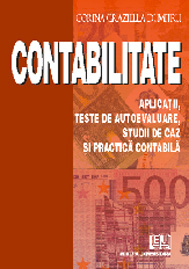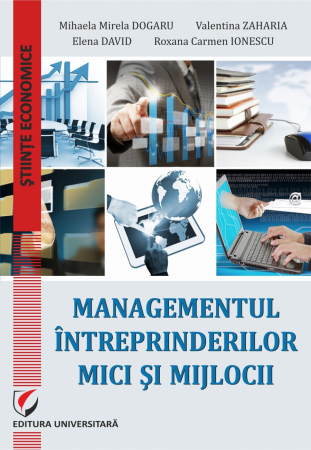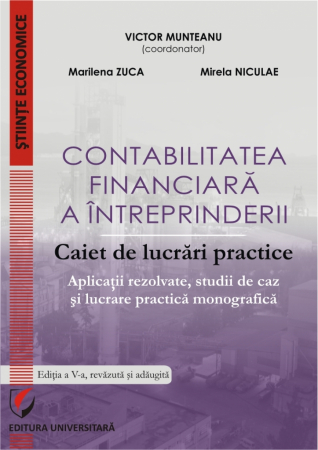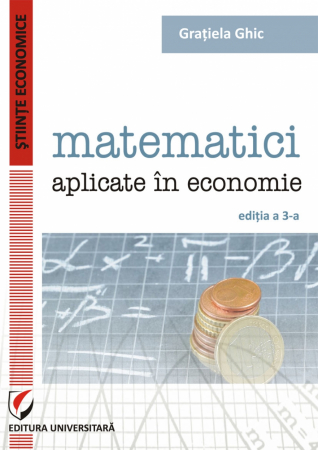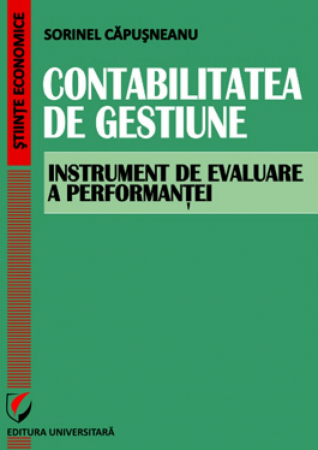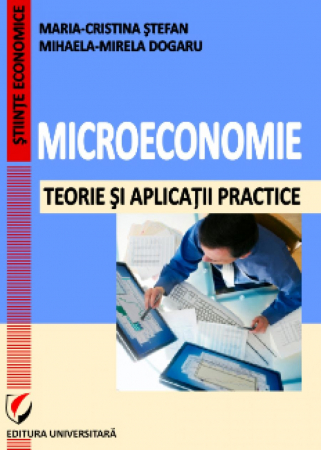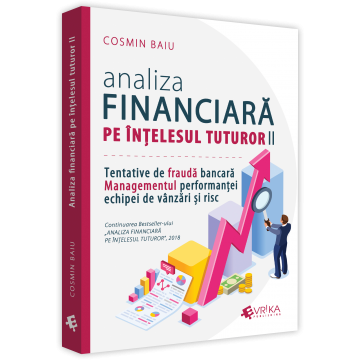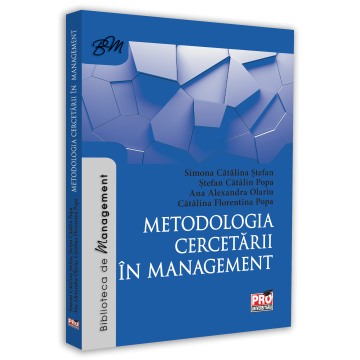Manuscript proposals: [email protected] / 0745 204 115 //// Tracking orders Individuals / Sales: 0745 200 357 / Orders Legal entities: 0721 722 783
ISBN: 978-606-28-1170-9
DOI: https://doi.org/10.5682/9786062811709
Publisher year: 2020
Edition: I
Publisher: Editura Universitară
Pages: 378
Author: Victor Munteanu - Coordonator
Product Code:
9786062811709
Do you need help?
0745 200 357
- Description
- Download (1)
- Authors
- Content
- More details
- Reviews (0)
Within the economic reform in our country, the managerial act presupposes, as a very important attribute, the permanent and systematic control over the economic activities of the enterprise - regardless of the organizational structures and the form of ownership in which they are realized, as well as over the activity of the administrative units. territorial or public institutions that manage goods, both in the public and private domain.
Control is a function of the management that ensures the knowledge and improvement of the management of assets and debts and of orientation, organization and development of the activity of production, distribution, marketing, promotion, etc. The knowledge by the interested parties of the way of carrying out the economic activities in conditions of legality and free initiative is a requirement of the modern management of the enterprise.
Knowledge is an imperative objective necessary for the management of economic entities (enterprises) in any field of activity in order to coordinate actions aimed at maximizing efficiency and effectiveness. Also, the knowledge of the economic-financial situation of the enterprises serves in making decisions regarding the commercial relations.
In the conditions of the market economy, control as a form of knowledge takes into account: the interests of entities, oriented towards profit maximization, the interests of third parties (respectively business partners, financial institutions, public or public interest institutions, other interested entities, etc.) and state interests.
Through control, management ensures its dynamic, real and accurate information, which determines valuable conclusions and quality decisions. Control penetrates the essence of the phenomena and effectively contributes to a scientific and efficient management, notices the negative aspects when they manifest themselves as a trend and intervenes operatively to prevent and eliminate the causes that generate them.
The control is not limited to ascertaining and identifying possible vulnerabilities or risks in the activity, but also contributes to their forecasting, to taking the necessary measures to mitigate the effects in order to improve the activity, as well as to eliminate the possibilities of deficiencies and anomalies.
Product compliance information
Control is a function of the management that ensures the knowledge and improvement of the management of assets and debts and of orientation, organization and development of the activity of production, distribution, marketing, promotion, etc. The knowledge by the interested parties of the way of carrying out the economic activities in conditions of legality and free initiative is a requirement of the modern management of the enterprise.
Knowledge is an imperative objective necessary for the management of economic entities (enterprises) in any field of activity in order to coordinate actions aimed at maximizing efficiency and effectiveness. Also, the knowledge of the economic-financial situation of the enterprises serves in making decisions regarding the commercial relations.
In the conditions of the market economy, control as a form of knowledge takes into account: the interests of entities, oriented towards profit maximization, the interests of third parties (respectively business partners, financial institutions, public or public interest institutions, other interested entities, etc.) and state interests.
Through control, management ensures its dynamic, real and accurate information, which determines valuable conclusions and quality decisions. Control penetrates the essence of the phenomena and effectively contributes to a scientific and efficient management, notices the negative aspects when they manifest themselves as a trend and intervenes operatively to prevent and eliminate the causes that generate them.
The control is not limited to ascertaining and identifying possible vulnerabilities or risks in the activity, but also contributes to their forecasting, to taking the necessary measures to mitigate the effects in order to improve the activity, as well as to eliminate the possibilities of deficiencies and anomalies.
-
Financial Control. Theoretical and Practical Approach
Download
VICTOR MUNTEANU - Coordonator
GRATIELA DUTA
JANINA SOARE
MIHAELA IBANISTEANU
CRISTIAN FLORIN GHEORGHE
GRATIELA DUTA
JANINA SOARE
MIHAELA IBANISTEANU
CRISTIAN FLORIN GHEORGHE
Foreword / 9
CHAPTER I: THE NEED FOR FINANCIAL CONTROL: CONCEPT / 11
1.1. The general context and the objective necessity of the financial control / 11
1.1.1. General context / 11
1.1.2. The objective need for financial control / 14
1.2. Attributes of the management of the entity (enterprise) and the concept of financial control / 15
1.3. Scope of action and objectives of financial control / 21
1.4. Functions of financial control / 25
1.5. Forms of financial control / 27
CHAPTER II: THE FINANCIAL CONTROL PROCESS / 32
2.1. Methodological system of financial control / 32
2.2. Financial control method / 34
2.3. Financial control procedures and techniques / 36
2.3.1. Preliminary general study / 36
2.3.2. Accounting documentary control / 37
I. The place and the role of the justifying documents within the informational system and the internal control system / 37
II. Checking the way of completing and using the supporting documents / 38
III. Checking the way of economic evidence / 50
IV. Classification of documentary control techniques - accounting / 56
2.3.3. Factual control 63
2.3.4. Total control or by sampling / 65
2.3.5. Economic-financial analysis / 67
2.4. The stages of performing the financial control / 70
2.4.1. Scheduling the financial control activity / 71
2.4.2. Preparation of the financial control action / 73
2.4.3. Carrying out the actual financial control / 76
2.4.4. Establishing the responsibilities of the guilty persons / 80
2.4.5. Preparation of financial control documents / 83
2.4.6. Capitalization of the results from the financial control / 86
CHAPTER III: ORGANIZATION AND EXERCISE OF THE FINANCIAL CONTROL ACTIVITY / 89
3.1. State financial control / 89
3.1.1. State financial control system / 90
3.1.2. Financial control of the state in the sphere of action of the executive / 90
3.1.2.1. Prime Minister's Control Corps / 91
3.1.2.2. Ministry of Public Finance / 92
1. Own control structures / 92
2. National Agency for Fiscal Administration (Fiscal Inspection) / 95
A. Procedures, methods and forms of fiscal inspection / 97
B. Carrying out the fiscal inspection / 98
C. Appeals against acts issued by the fiscal bodies / 117
D. Collection and settlement of tax receivables / 121
3. General Directorate for Fiscal Anti-Fraud / 135
4. General Directorate of Customs / 139
3.1.3. Financial control of the state in the sphere of action of the legislature / 144
3.1.3.1. Parliamentary committees / 144
3.1.3.2. Court of Accounts / 145
1. Control and audit of the Court of Accounts / 145
2. Audit Authority / 161
3.2. Own financial control of public and economic entities / 163
3.2.1. Internal public control and audit of public entities / 163
3.2.1.1. Internal public control and audit / 163
1. Internal control / 164
2. Public internal audit / 166
3.2.1.2. Financial control - own / 171
1. Preventive financial control / 171
2. Financial management control / 172
3.2.2. Financial control - own accounting of economic entities / 177
1. Internal control / 177
2. Preventive financial control / 179
3. Financial management control / 180
4. Financial control by inventory / 183
CHAPTER IV: FISCAL CONTROL AND TAX EVASION / 217
4.1. Fiscal control / 217
4.1.1. The concepts of fiscal control, taxpayer, fiscal inspector / 217
4.1.2. Fiscal registration and taxpayers' record / 218
4.1.3. The rights and obligations of the fiscal apparatus and of the taxpayers / 219
4.1.4. Rules of procedure, techniques and instruments of fiscal control / 219
4.1.5. Settlement of appeals against fiscal administrative acts / 221
4.1.6. Rules of procedure, techniques and instruments of fiscal control / 226
4.1.7. Settlement of appeals against fiscal administrative acts / 227
4.2. Tax evasion / 230
4.2.1. The concept of tax evasion / 230
4.2.2. Forms of tax evasion / 233
4.2.3. Economic crimes / 240
4.2.4. Internationalization of tax fraud / 253
4.2.5. The impact of the internationalization of fiscal fraud on the Romanian economy / 253
4.2.6. Organization and functioning of the fiscal record / 255
CHAPTER V: FINALIZATION OF FINANCIAL CONTROL / 257
5.1. Disciplinary liability / 257
5.2. Contraventional liability / 258
5.3. Types of contraventions / 262
5.3.1. Contraventions related to the organization and management of accounting / 262
5.3.2. Contraventions or offenses regarding the facts generating tax evasion / 264
5.3.2.1. Contraventions and crimes related to the fiscal registration of economic entities / 264
5.3.2.2. Contraventions and offenses regarding the profit tax / 265
5.3.2.3. Contraventions to the norms regarding the value added tax / 266
5.3.3. Contraventions related to the work performed and employment / 272
5.4. Material liability / 273
5.4.1. Material liability in connection with the management of assets / 284
5.4.2. Material responsibility in connection with the financial - accounting activity / 287
5.5. Criminal liability / 289
5.5.1. Offenses provided in the penal code / 290
5.5.2. Offenses provided for in special laws / 292
CHAPTER VI: PRACTICAL CASES OF CONTROL / FISCAL INSPECTION / 296
6.1. Fiscal inspection regarding the profit tax and VAT / 296
6.2. Fiscal inspection regarding the procedures for settling the returns with negative amounts of VAT, with reimbursement option / 326
6.3. Fiscal inspection regarding excises / 345
BIBLIOGRAPHY / 373
CHAPTER I: THE NEED FOR FINANCIAL CONTROL: CONCEPT / 11
1.1. The general context and the objective necessity of the financial control / 11
1.1.1. General context / 11
1.1.2. The objective need for financial control / 14
1.2. Attributes of the management of the entity (enterprise) and the concept of financial control / 15
1.3. Scope of action and objectives of financial control / 21
1.4. Functions of financial control / 25
1.5. Forms of financial control / 27
CHAPTER II: THE FINANCIAL CONTROL PROCESS / 32
2.1. Methodological system of financial control / 32
2.2. Financial control method / 34
2.3. Financial control procedures and techniques / 36
2.3.1. Preliminary general study / 36
2.3.2. Accounting documentary control / 37
I. The place and the role of the justifying documents within the informational system and the internal control system / 37
II. Checking the way of completing and using the supporting documents / 38
III. Checking the way of economic evidence / 50
IV. Classification of documentary control techniques - accounting / 56
2.3.3. Factual control 63
2.3.4. Total control or by sampling / 65
2.3.5. Economic-financial analysis / 67
2.4. The stages of performing the financial control / 70
2.4.1. Scheduling the financial control activity / 71
2.4.2. Preparation of the financial control action / 73
2.4.3. Carrying out the actual financial control / 76
2.4.4. Establishing the responsibilities of the guilty persons / 80
2.4.5. Preparation of financial control documents / 83
2.4.6. Capitalization of the results from the financial control / 86
CHAPTER III: ORGANIZATION AND EXERCISE OF THE FINANCIAL CONTROL ACTIVITY / 89
3.1. State financial control / 89
3.1.1. State financial control system / 90
3.1.2. Financial control of the state in the sphere of action of the executive / 90
3.1.2.1. Prime Minister's Control Corps / 91
3.1.2.2. Ministry of Public Finance / 92
1. Own control structures / 92
2. National Agency for Fiscal Administration (Fiscal Inspection) / 95
A. Procedures, methods and forms of fiscal inspection / 97
B. Carrying out the fiscal inspection / 98
C. Appeals against acts issued by the fiscal bodies / 117
D. Collection and settlement of tax receivables / 121
3. General Directorate for Fiscal Anti-Fraud / 135
4. General Directorate of Customs / 139
3.1.3. Financial control of the state in the sphere of action of the legislature / 144
3.1.3.1. Parliamentary committees / 144
3.1.3.2. Court of Accounts / 145
1. Control and audit of the Court of Accounts / 145
2. Audit Authority / 161
3.2. Own financial control of public and economic entities / 163
3.2.1. Internal public control and audit of public entities / 163
3.2.1.1. Internal public control and audit / 163
1. Internal control / 164
2. Public internal audit / 166
3.2.1.2. Financial control - own / 171
1. Preventive financial control / 171
2. Financial management control / 172
3.2.2. Financial control - own accounting of economic entities / 177
1. Internal control / 177
2. Preventive financial control / 179
3. Financial management control / 180
4. Financial control by inventory / 183
CHAPTER IV: FISCAL CONTROL AND TAX EVASION / 217
4.1. Fiscal control / 217
4.1.1. The concepts of fiscal control, taxpayer, fiscal inspector / 217
4.1.2. Fiscal registration and taxpayers' record / 218
4.1.3. The rights and obligations of the fiscal apparatus and of the taxpayers / 219
4.1.4. Rules of procedure, techniques and instruments of fiscal control / 219
4.1.5. Settlement of appeals against fiscal administrative acts / 221
4.1.6. Rules of procedure, techniques and instruments of fiscal control / 226
4.1.7. Settlement of appeals against fiscal administrative acts / 227
4.2. Tax evasion / 230
4.2.1. The concept of tax evasion / 230
4.2.2. Forms of tax evasion / 233
4.2.3. Economic crimes / 240
4.2.4. Internationalization of tax fraud / 253
4.2.5. The impact of the internationalization of fiscal fraud on the Romanian economy / 253
4.2.6. Organization and functioning of the fiscal record / 255
CHAPTER V: FINALIZATION OF FINANCIAL CONTROL / 257
5.1. Disciplinary liability / 257
5.2. Contraventional liability / 258
5.3. Types of contraventions / 262
5.3.1. Contraventions related to the organization and management of accounting / 262
5.3.2. Contraventions or offenses regarding the facts generating tax evasion / 264
5.3.2.1. Contraventions and crimes related to the fiscal registration of economic entities / 264
5.3.2.2. Contraventions and offenses regarding the profit tax / 265
5.3.2.3. Contraventions to the norms regarding the value added tax / 266
5.3.3. Contraventions related to the work performed and employment / 272
5.4. Material liability / 273
5.4.1. Material liability in connection with the management of assets / 284
5.4.2. Material responsibility in connection with the financial - accounting activity / 287
5.5. Criminal liability / 289
5.5.1. Offenses provided in the penal code / 290
5.5.2. Offenses provided for in special laws / 292
CHAPTER VI: PRACTICAL CASES OF CONTROL / FISCAL INSPECTION / 296
6.1. Fiscal inspection regarding the profit tax and VAT / 296
6.2. Fiscal inspection regarding the procedures for settling the returns with negative amounts of VAT, with reimbursement option / 326
6.3. Fiscal inspection regarding excises / 345
BIBLIOGRAPHY / 373
Within the economic reform in our country, the managerial act presupposes, as a very important attribute, the permanent and systematic control over the economic activities of the enterprise - regardless of the organizational structures and the form of ownership in which they are realized, as well as over the activity of the administrative units. territorial or public institutions that manage goods, both in the public and private domain.
Control is a function of the management that ensures the knowledge and improvement of the management of assets and debts and of orientation, organization and development of the activity of production, distribution, marketing, promotion, etc. The knowledge by the interested parties of the way of carrying out the economic activities in conditions of legality and free initiative is a requirement of the modern management of the enterprise.
Knowledge is an imperative objective necessary for the management of economic entities (enterprises) in any field of activity in order to coordinate actions aimed at maximizing efficiency and effectiveness. Also, the knowledge of the economic-financial situation of the enterprises serves in making decisions regarding the commercial relations.
In the conditions of the market economy, control as a form of knowledge takes into account: the interests of entities, oriented towards profit maximization, the interests of third parties (respectively business partners, financial institutions, public or public interest institutions, other interested entities, etc.) and state interests.
Through control, management ensures its dynamic, real and accurate information, which determines valuable conclusions and quality decisions. Control penetrates the essence of the phenomena and effectively contributes to a scientific and efficient management, notices the negative aspects when they manifest themselves as a trend and intervenes operatively to prevent and eliminate the causes that generate them.
The control is not limited to ascertaining and identifying possible vulnerabilities or risks in the activity, but also contributes to their forecasting, to taking the necessary measures to mitigate the effects in order to improve the activity, as well as to eliminate the possibilities of deficiencies and anomalies.
In order to maximize the profit, besides evaluating the results in relation to the established objectives, the control also contributes to the identification and prevention of the tendencies and phenomena that require correction decisions.
The public control in Romania is performed by the Court of Accounts, the Ministry of Public Finance through the National Agency for Fiscal Administration - General Directorate of Fiscal Inspection, General Directorate of Fiscal Antifraud, General Directorate of Customs. These bodies perform an external control in various forms regarding the obligations of different public entities, companies, as taxpayers, etc., as well as an internal control of their own activity.
At the same time, the entities organize their own financial control necessary for the good management of assets and debts, but also in public institutions is regulated the activity of managerial / internal control and internal public audit regarding the use of public funds and administration of public patrimony.
The social economic development of the country in the period of transition and consolidation of the market economy presupposes the thorough knowledge by the state of the universally valid laws, of the economic laws of the market economy, as well as their fair application to the concrete conditions in our country. Ensuring the essential requirements of economic laws involves the continuous improvement of economic and social activities, forms and methods of governing the entire economy. The realization of this desideratum requires from the state not only the elaboration of normative acts but also the organization and exercise of a firm and rigorous control over the entire economy.
This demonstrates the need for control activity determined by objective causes and first of all by the forms of ownership, the production of goods and the action of economic laws specific to the market economy.
All the aspects mentioned above are just as many ideas that outline the fact that among the administrative methods of management, a special, priority place is occupied by the control, under its multiple forms of manifestation, to which this work is dedicated.
In this context, the paper deals with the study of the methodology, as well as of the organization and exercise of the control activity in general, financial-accounting and fiscal control, especially, both from a practical and applicative point of view. His methodical-didactic approach aims to offer those interested the most efficient ways to understand and deepen all aspects related to financial-accounting control, to form a logical, independent thinking in the practice of this profession, as well as the necessary skills.
In this sense, the paper is addressed, first of all, to those who in the faculties (license and master) or other forms of professional training study the financial-accounting control.
It is intended, secondly, for practitioners in the field of financial-accounting control, tax inspectors, accounting experts, financial analysts and other specialists who want to deepen the informational values of this field.
When writing the paper, they used a rich legislation and foreign literature, but especially local. We thank the Romanian normalizers (Ministry of Public Finance, Court of Accounts, etc.) for their efforts to create and improve a financial control system.
We also appreciate the interest and professional competence of specialists in higher education, research and practice in the field of financial-accounting control for books, studies and our own points of view that have seen the light of day and that have been of real use to us in writing. works.
We enjoyed the qualified support of the publishing house, the printing house, the editor and the word processors, who took care of the operative preparation and the appearance in the best conditions of the work, for which we thank them.
We thank, a priori, our readers, students (bachelor and master), teachers, specialists who will have the patience and interest to read and use this book.
We are aware that the work can be improved, that it can be the subject of critical reflections, suggestions and proposals that we are waiting for with due attention and that we will receive with pleasure and distinguished consideration and we will consider them in a possible edition. .
Bucharest, October 2020
The authors,
Control is a function of the management that ensures the knowledge and improvement of the management of assets and debts and of orientation, organization and development of the activity of production, distribution, marketing, promotion, etc. The knowledge by the interested parties of the way of carrying out the economic activities in conditions of legality and free initiative is a requirement of the modern management of the enterprise.
Knowledge is an imperative objective necessary for the management of economic entities (enterprises) in any field of activity in order to coordinate actions aimed at maximizing efficiency and effectiveness. Also, the knowledge of the economic-financial situation of the enterprises serves in making decisions regarding the commercial relations.
In the conditions of the market economy, control as a form of knowledge takes into account: the interests of entities, oriented towards profit maximization, the interests of third parties (respectively business partners, financial institutions, public or public interest institutions, other interested entities, etc.) and state interests.
Through control, management ensures its dynamic, real and accurate information, which determines valuable conclusions and quality decisions. Control penetrates the essence of the phenomena and effectively contributes to a scientific and efficient management, notices the negative aspects when they manifest themselves as a trend and intervenes operatively to prevent and eliminate the causes that generate them.
The control is not limited to ascertaining and identifying possible vulnerabilities or risks in the activity, but also contributes to their forecasting, to taking the necessary measures to mitigate the effects in order to improve the activity, as well as to eliminate the possibilities of deficiencies and anomalies.
In order to maximize the profit, besides evaluating the results in relation to the established objectives, the control also contributes to the identification and prevention of the tendencies and phenomena that require correction decisions.
The public control in Romania is performed by the Court of Accounts, the Ministry of Public Finance through the National Agency for Fiscal Administration - General Directorate of Fiscal Inspection, General Directorate of Fiscal Antifraud, General Directorate of Customs. These bodies perform an external control in various forms regarding the obligations of different public entities, companies, as taxpayers, etc., as well as an internal control of their own activity.
At the same time, the entities organize their own financial control necessary for the good management of assets and debts, but also in public institutions is regulated the activity of managerial / internal control and internal public audit regarding the use of public funds and administration of public patrimony.
The social economic development of the country in the period of transition and consolidation of the market economy presupposes the thorough knowledge by the state of the universally valid laws, of the economic laws of the market economy, as well as their fair application to the concrete conditions in our country. Ensuring the essential requirements of economic laws involves the continuous improvement of economic and social activities, forms and methods of governing the entire economy. The realization of this desideratum requires from the state not only the elaboration of normative acts but also the organization and exercise of a firm and rigorous control over the entire economy.
This demonstrates the need for control activity determined by objective causes and first of all by the forms of ownership, the production of goods and the action of economic laws specific to the market economy.
All the aspects mentioned above are just as many ideas that outline the fact that among the administrative methods of management, a special, priority place is occupied by the control, under its multiple forms of manifestation, to which this work is dedicated.
In this context, the paper deals with the study of the methodology, as well as of the organization and exercise of the control activity in general, financial-accounting and fiscal control, especially, both from a practical and applicative point of view. His methodical-didactic approach aims to offer those interested the most efficient ways to understand and deepen all aspects related to financial-accounting control, to form a logical, independent thinking in the practice of this profession, as well as the necessary skills.
In this sense, the paper is addressed, first of all, to those who in the faculties (license and master) or other forms of professional training study the financial-accounting control.
It is intended, secondly, for practitioners in the field of financial-accounting control, tax inspectors, accounting experts, financial analysts and other specialists who want to deepen the informational values of this field.
When writing the paper, they used a rich legislation and foreign literature, but especially local. We thank the Romanian normalizers (Ministry of Public Finance, Court of Accounts, etc.) for their efforts to create and improve a financial control system.
We also appreciate the interest and professional competence of specialists in higher education, research and practice in the field of financial-accounting control for books, studies and our own points of view that have seen the light of day and that have been of real use to us in writing. works.
We enjoyed the qualified support of the publishing house, the printing house, the editor and the word processors, who took care of the operative preparation and the appearance in the best conditions of the work, for which we thank them.
We thank, a priori, our readers, students (bachelor and master), teachers, specialists who will have the patience and interest to read and use this book.
We are aware that the work can be improved, that it can be the subject of critical reflections, suggestions and proposals that we are waiting for with due attention and that we will receive with pleasure and distinguished consideration and we will consider them in a possible edition. .
Bucharest, October 2020
The authors,
If you want to express your opinion about this product you can add a review.
write a review

6359.png)
![Financial Control. Theoretical and Practical Approach [1] Financial Control. Theoretical and Practical Approach [1]](https://gomagcdn.ro/domains/editurauniversitara.ro/files/product/large/financial-control-theoretical-and-practical-approach-2996-8094.jpg)
